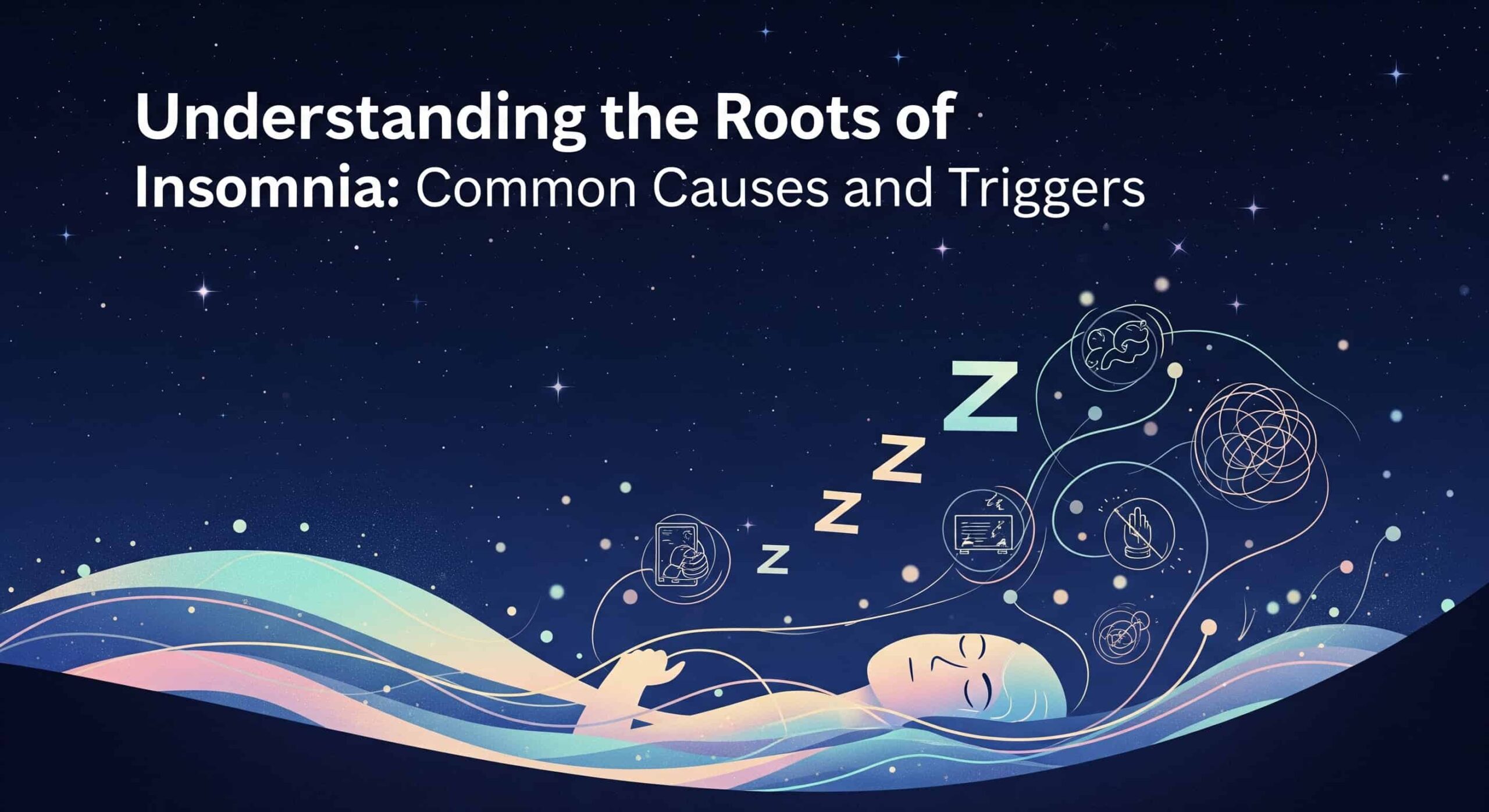Keywords: causes of insomnia, reasons for insomnia, sleep problems, stress and sleep, anxiety insomnia, lifestyle and insomnia, medical causes of insomnia
Insomnia, the persistent difficulty in falling asleep, staying asleep, or achieving restorative sleep, affects millions worldwide. It's more than just a bad night; chronic insomnia can significantly impact physical health, mental well-being, and daily functioning. Understanding the underlying causes is the first step towards finding effective solutions. Insomnia is often multifactorial, meaning several factors can contribute simultaneously.
I. Psychological Factors
Mental and emotional states are among the most common culprits behind sleepless nights.
1. Stress
Concerns about work, school, health, finances, or family can keep your mind active at night, making it difficult to sleep. Traumatic life events, such as the death or illness of a loved one, divorce, or job loss, can also lead to insomnia. Even positive stress, like planning a wedding or moving, can disrupt sleep patterns.
2. Anxiety Disorders
Generalized anxiety disorder, panic disorder, and post-traumatic stress disorder (PTSD) often co-occur with insomnia. Anxious thoughts, worries, and a heightened state of arousal make relaxation and sleep onset challenging. The fear of not being able to sleep (sleep anxiety) can itself become a self-fulfilling prophecy.
3. Depression
Sleep problems are a hallmark symptom of depression. Individuals with depression may experience difficulty falling asleep, staying asleep (especially early morning awakenings), or, conversely, oversleeping (hypersomnia). The neurochemical imbalances associated with depression can directly affect sleep-wake cycles.
II. Lifestyle and Environmental Factors
Daily habits and your sleep environment play a crucial role in sleep quality.
1. Poor Sleep Habits (Sleep Hygiene)
Irregular bedtime schedules, frequent napping (especially late in the day), using bed for activities other than sleep or sex (like working or watching TV), and an uncomfortable sleep environment (too bright, noisy, hot, or cold) can interfere with your natural sleep rhythms.
2. Diet and Substance Use
- Caffeine and Nicotine: These are stimulants that can take hours to wear off, making it hard to fall asleep. Consuming them late in the day is particularly problematic.
- Alcohol: While alcohol might make you feel drowsy initially, it can disrupt sleep later in the night, leading to fragmented and unrefreshing sleep.
- Heavy Meals Before Bed: Eating large meals or spicy foods close to bedtime can cause discomfort, indigestion, or heartburn, interfering with sleep.
3. Lack of Physical Activity or Exercising Too Close to Bedtime
Regular physical activity can promote better sleep. However, exercising vigorously too close to bedtime can be stimulating and make it harder to fall asleep for some individuals.
4. Shift Work or Travel
Working night shifts, early morning shifts, or rotating shifts can disrupt your body's internal clock (circadian rhythm). Similarly, traveling across multiple time zones (jet lag) can throw off your sleep-wake cycle.
5. Excessive Screen Time Before Bed
The blue light emitted by smartphones, tablets, computers, and televisions can suppress the production of melatonin, a hormone that regulates sleep, making it harder to fall asleep.
III. Medical Conditions
Various physical health issues can contribute to or cause insomnia.
1. Chronic Pain
Conditions like arthritis, fibromyalgia, back pain, or headaches can make it difficult to find a comfortable sleeping position and stay asleep.
2. Respiratory Problems
Asthma, chronic obstructive pulmonary disease (COPD), and allergies can cause nighttime coughing, wheezing, or shortness of breath, disrupting sleep. Sleep apnea, a condition where breathing repeatedly stops and starts during sleep, is a major cause of poor sleep quality and daytime fatigue.
3. Neurological Disorders
Conditions like Parkinson's disease, Alzheimer's disease, and restless legs syndrome (RLS) are often associated with sleep disturbances.
4. Endocrine and Hormonal Issues
Hyperthyroidism (overactive thyroid), diabetes (due to fluctuations in blood sugar or frequent urination), and hormonal shifts during menstruation, pregnancy, or menopause can affect sleep.
5. Gastrointestinal Issues
Gastroesophageal reflux disease (GERD) or acid reflux can cause heartburn and discomfort when lying down, leading to sleep disruption.
6. Other Medical Conditions
Conditions like heart disease, kidney disease, and cancer can also contribute to insomnia due to symptoms, treatments, or associated stress.
IV. Medications
Many prescription and over-the-counter medications can interfere with sleep.
Common Culprits Include:
- Certain antidepressants (e.g., some SSRIs)
- Medications for ADHD (stimulants)
- Corticosteroids (e.g., prednisone) for inflammation
- Some blood pressure medications (e.g., beta-blockers)
- Decongestants and some cold/allergy medications containing pseudoephedrine
- Weight-loss products containing stimulants
- Some asthma medications (e.g., theophylline)
V. Age-Related Changes
As people age, sleep patterns often change.
Changes in Older Adults:
- Altered Sleep Architecture: Older adults tend to have less deep sleep and more light sleep, with more frequent awakenings.
- Changes in Circadian Rhythm: They may feel sleepy earlier in the evening and wake up earlier in the morning.
- Increased Prevalence of Medical Conditions: Older adults are more likely to have chronic health conditions and take medications that can affect sleep.
- Reduced Physical Activity and Social Engagement: These can also contribute to sleep problems.
Identifying Your Triggers
Insomnia is a complex issue with a wide range of potential causes. Often, it's a combination of factors rather than a single trigger. Identifying the specific reasons behind your sleep difficulties is crucial for developing an effective treatment plan. This might involve lifestyle adjustments, addressing underlying medical or psychological conditions, or seeking professional help.
Important: If you're struggling with persistent insomnia, consulting with a healthcare provider can help you pinpoint the causes and explore appropriate solutions to reclaim restful nights. This article provides general information and should not be considered medical advice.




